


Moving into a period when animation began to be generally fun again, with a variety of offerings from the Fox Network, the Disney Afternoon, and Kids WB plus WB prime time. Also, in answer to a reader’s request from last week, a critique of a somewhat deservedly-forgotten “Superstar” special featuring a real-life baseball legend – in a role he should never have played.

First, to get it out of the way, the title suggested by one of our readers last week. I caught, for the first (and last) time, a special produced by Rankin-Bass for the ABC Saturday Superstar Movie – an anthology show from which I can’t honestly say I know of anything which appeared on it which was really worth watching. I had never even heard of this film, nor was it readily available anywhere except Internet Archive. The title alone seemed intimidating, and my worst expectations were met by Willie Mays and the Say-Hey Kid (10/14/72).
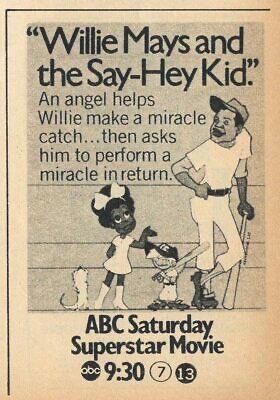 Honestly, I don’t know how sports figures (and other celebrities) get themselves roped into such half-hearted, poorly-scripted, ill-conceived, ridiculous and unappealing vanity projects – except for the almighty dollar. I am still rather shaken and shocked that Mays would associate himself with such a work, and I can’t imagine that any adult or child exposed to this film could possibly think highly of him for doing so. It is such a sellout, I simply can’t help but think less of the man for taking the money and wasting our time. Animation may be a ticket to immortality for some – but not this kind of animation – and Willie should have known it. Perhaps this script, which probably could have inserted any ball player interchangeably into the title role, should have gone to Pete Rose – at least he might have needed the money to pay his gambling debts.
Honestly, I don’t know how sports figures (and other celebrities) get themselves roped into such half-hearted, poorly-scripted, ill-conceived, ridiculous and unappealing vanity projects – except for the almighty dollar. I am still rather shaken and shocked that Mays would associate himself with such a work, and I can’t imagine that any adult or child exposed to this film could possibly think highly of him for doing so. It is such a sellout, I simply can’t help but think less of the man for taking the money and wasting our time. Animation may be a ticket to immortality for some – but not this kind of animation – and Willie should have known it. Perhaps this script, which probably could have inserted any ball player interchangeably into the title role, should have gone to Pete Rose – at least he might have needed the money to pay his gambling debts.
I previously got on the case of Michael Jordan for his mediocre acting in “Space Jam” – but Jordan’s performance could win a Best Picture Oscar when compared side-by-side with Mays’ reads. Several spots in the film show Willie or his alleged aunt half-asleep. Yet, Mays’ soundtrack sounds like he’s asleep even in the scenes where he’s supposed to be awake. Had he realized by the time of recording the track just how dull and uninteresting the script was? Or was that just the way he talked in real life? The only one making any feeble attempt to breathe some life into his lines is old-standby Paul Frees, who seems to take on 90 percent of the incidental voices in the film, including K.C., a midget guardian angel, whom Frees voices in his Captain Peachfuzz voice from Rocky and his Friends, crossed with a little more Hugh Herbert befuddledness. I wouldn’t be surprised if most of his dialog as the angel was ad-libbed, as it may be the brightest spot in the show, seemingly beyond the pen of its writer. A few lines from Frees as a taxi driver and as an umpire also generate mild smiles.
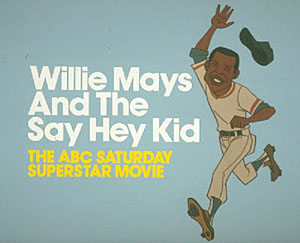 Romeo Muller (who seems at this time to have been Rankin-Bass’s one and only default screenwriter) turns in one of his worst works – way down on the ladder below “The Leprechauns’ Christmas Gold”. 2D animation was never the studio’s forte, and the “artwork”, probably imported from the same underpaid artists who created “King Kong”, is stilted, mostly expressionless, and often ugly.
Romeo Muller (who seems at this time to have been Rankin-Bass’s one and only default screenwriter) turns in one of his worst works – way down on the ladder below “The Leprechauns’ Christmas Gold”. 2D animation was never the studio’s forte, and the “artwork”, probably imported from the same underpaid artists who created “King Kong”, is stilted, mostly expressionless, and often ugly.
As for plot – if you can stand it – Mays finds a headstrong little girl (Veronica) appearing on his doorstep with her pet iguana (Sweetheart) out of the blue one morning, calling him her “Goddaddy”. She (if I got things straight) is the daughter of some old college or war buddy of Mays, whom Mays can hardly remember, nor is it even certain that the father ever told Mays he was being named as her Godfather in the first place. Mom died shortly after birth, and father abandoned her before she can remember to engage in mining in some South American country, leaving her with relatives who could care less about her. It is uncertain if the relatives threw her out, or she ran away. Whatever, she barges in and starts taking over the household and interfering with Willie’s life. Her voice reads sound too old for the age she is playing, and are quite unconvincing. She claims to have been helped in getting there by a “guardian angel”, whom Willie at first never sees.
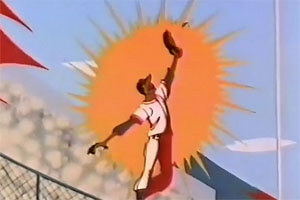 The kid and her iguana cause interference at the first of Willie’s games they attend, the iguana getting on the field and swallowing the baseball, costing Willie a game-losing error. The next game is the team’s (the Mets) last chance to win the pennant and go to the World Series. A long one is hit by the opponents toward the outfield fence, and the announcer believes it is too high for Willie to reach. Willie, running for the ball, wishes aloud that he’d do anything to make that catch. As he jumps, a pink flash envelops him and the stadium, freezing everyone in place, including Willie in mid-air, halfway to the ball, but leaving only Willie capable of thinking and talking. Enter K.C., a sort of goofy miniature guardian angel. He is the one Veronica spoke of, and claims to be doing split-duty as Willie’s guardian angel too. To emphasize his goofiness, as the angel talks, he swipes a gag from Disney, walking around the perimeter of the screen frame on all sides, just as the pink elephants did in Dumbo and the Aracuan Bird in “Clown of the Jungle”. The angel makes a proposition to Willie – adopt Veronica legally, and always respond to her distress call (“Say-Hey”), in return for a little angel assistance in making the catch. Mays agrees. (Oddly, in real life, Willie, with no biological children, adopted a son. Why a daughter was chosen here remains unknown.)
The kid and her iguana cause interference at the first of Willie’s games they attend, the iguana getting on the field and swallowing the baseball, costing Willie a game-losing error. The next game is the team’s (the Mets) last chance to win the pennant and go to the World Series. A long one is hit by the opponents toward the outfield fence, and the announcer believes it is too high for Willie to reach. Willie, running for the ball, wishes aloud that he’d do anything to make that catch. As he jumps, a pink flash envelops him and the stadium, freezing everyone in place, including Willie in mid-air, halfway to the ball, but leaving only Willie capable of thinking and talking. Enter K.C., a sort of goofy miniature guardian angel. He is the one Veronica spoke of, and claims to be doing split-duty as Willie’s guardian angel too. To emphasize his goofiness, as the angel talks, he swipes a gag from Disney, walking around the perimeter of the screen frame on all sides, just as the pink elephants did in Dumbo and the Aracuan Bird in “Clown of the Jungle”. The angel makes a proposition to Willie – adopt Veronica legally, and always respond to her distress call (“Say-Hey”), in return for a little angel assistance in making the catch. Mays agrees. (Oddly, in real life, Willie, with no biological children, adopted a son. Why a daughter was chosen here remains unknown.)
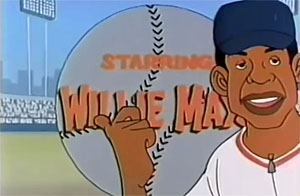 More troublesome misadventures with the kid, while Willie progresses into a tight World Series. But Willie signs papers to apply for adoption as promised. Then a bombshell. A newspaper article reveals the death of her long-lost father – and that he has left a tin mine in South America worth twenty million dollars. (With all that dough, why wasn’t he sending support money to the kid?) Veronica doesn’t cry a tear, having really never known him. But suddenly, the relatives she ran away from all swamp the Mays household, with a court order demanding her back. (How did they find her in the first place?) Mays’ attorney claims he hasn’t a leg to stand on to keep her. Mays faces the final game of the series in a depression, unable to get it together in light of losing Veronica. The distress call of “Say-Hey” magically appears on the scoreboard, and the angel appears, ushering Willie out of the dugout and into a hotel elevator from nowhere, transporting Willie to a hotel room where Veronica is hiding out from her greedy and uncaring relatives. They also arrive on the scene, and a confrontation is about to develop, when a news bulletin appears on a TV set in the room. The country where the tin mine is located has been taken over in a military coup, and all holdings of foreigners have been seized by the government – including the tin mine. In fact, the owner of such mine is sought for owing money to the government. Veronica’s relatives all feel a sudden need to be elsewhere, and the guardian angel appears only to Willie’s eyes, passing him a set of papers to have the relatives sign, relinquishing all claims to the child. The signatures are hastily given, and Veronica is Willie’s again. Willie asks her to switch the channel to the game to see what’s happening, but Veronica observes that the set is not even plugged in. K.C. appears again, revealing that he worked a little magic to produce the news bulletin – a total fake. So it seems that Veronica is still a multi-millionairess, but of course, is just happy to be with Willie. (Though the moral of the story still seems to be, money is nice when you can get it, even by false pretenses – something not unsimilar to how Willie got his paycheck for this project.) Willie is returned to the game in time to hit the winning home run, closing the show. Lame.
More troublesome misadventures with the kid, while Willie progresses into a tight World Series. But Willie signs papers to apply for adoption as promised. Then a bombshell. A newspaper article reveals the death of her long-lost father – and that he has left a tin mine in South America worth twenty million dollars. (With all that dough, why wasn’t he sending support money to the kid?) Veronica doesn’t cry a tear, having really never known him. But suddenly, the relatives she ran away from all swamp the Mays household, with a court order demanding her back. (How did they find her in the first place?) Mays’ attorney claims he hasn’t a leg to stand on to keep her. Mays faces the final game of the series in a depression, unable to get it together in light of losing Veronica. The distress call of “Say-Hey” magically appears on the scoreboard, and the angel appears, ushering Willie out of the dugout and into a hotel elevator from nowhere, transporting Willie to a hotel room where Veronica is hiding out from her greedy and uncaring relatives. They also arrive on the scene, and a confrontation is about to develop, when a news bulletin appears on a TV set in the room. The country where the tin mine is located has been taken over in a military coup, and all holdings of foreigners have been seized by the government – including the tin mine. In fact, the owner of such mine is sought for owing money to the government. Veronica’s relatives all feel a sudden need to be elsewhere, and the guardian angel appears only to Willie’s eyes, passing him a set of papers to have the relatives sign, relinquishing all claims to the child. The signatures are hastily given, and Veronica is Willie’s again. Willie asks her to switch the channel to the game to see what’s happening, but Veronica observes that the set is not even plugged in. K.C. appears again, revealing that he worked a little magic to produce the news bulletin – a total fake. So it seems that Veronica is still a multi-millionairess, but of course, is just happy to be with Willie. (Though the moral of the story still seems to be, money is nice when you can get it, even by false pretenses – something not unsimilar to how Willie got his paycheck for this project.) Willie is returned to the game in time to hit the winning home run, closing the show. Lame.
• The Rankin-Bass Willie Mays film is on Internet Archive.
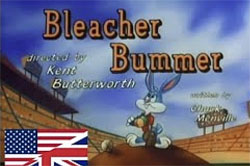 Warner and Spielberg’s “Tiny Toon Adventures” produced two sports anthology episodes, both of which feature short cartoons on baseball. In Bleacher Bummer (from “The Wacko World of Sports”, 10/30/90), Dizzy Devil, more interested in eating than in watching a baseball game, devours trash cans of food in the stadium parking lot, picking up Furrball as a passenger along the way – then realizes there is more food to be had inside the stadium than outside of it. Engaging in a Tasmanian Devil tornado spin, he attempts to zoom through the main gate turnstile, past ticket-taker/security guard Arnold (the Schwarzenneger-voiced muscle dog). There aren’t really a whole lot of notable gags – mostly inconsequential efforts by Arnold to pursue the two gate crashers. Brief action on the field has the Acme Looniversity team facing rival Perfecto Prep. Buster on the mound shows off his wild wind-up, dizzying the eyes of field announcer Sylvester. Buster stops in mid-action, allowing the ball to orbit around him by itself, as he addresses the audience with “When you got it, flaunt it.” But his pitching prowess seems no match for Perfecto’s bats, which go on a tear, racking up 400 runs plus change. Dizzy catches one foul ball – not as a souvenir, but to eat it. Finally, Arnold pursues Dizzy and Furrball over the roof of Perfecto’s dugout and onto the field, where Dizzy and Furrball land upon one of the Perfecto players, snapping his bat in two. Inside the bat is revealed a magnet – and apparently, the balls have been tampered with too, as Arnold discovers them to be instantly attracted to the bat by metal inserts. Perfecto cheated, and Arnold ejects their entire team over the wall. At an end-of-season banquet, the three chasers are honored for saving Acme from a humiliating defeat. Dizzy and Furrball chow down on food, and utter in unison (though Furrball normally doesn’t speak), “We like baseball!”
Warner and Spielberg’s “Tiny Toon Adventures” produced two sports anthology episodes, both of which feature short cartoons on baseball. In Bleacher Bummer (from “The Wacko World of Sports”, 10/30/90), Dizzy Devil, more interested in eating than in watching a baseball game, devours trash cans of food in the stadium parking lot, picking up Furrball as a passenger along the way – then realizes there is more food to be had inside the stadium than outside of it. Engaging in a Tasmanian Devil tornado spin, he attempts to zoom through the main gate turnstile, past ticket-taker/security guard Arnold (the Schwarzenneger-voiced muscle dog). There aren’t really a whole lot of notable gags – mostly inconsequential efforts by Arnold to pursue the two gate crashers. Brief action on the field has the Acme Looniversity team facing rival Perfecto Prep. Buster on the mound shows off his wild wind-up, dizzying the eyes of field announcer Sylvester. Buster stops in mid-action, allowing the ball to orbit around him by itself, as he addresses the audience with “When you got it, flaunt it.” But his pitching prowess seems no match for Perfecto’s bats, which go on a tear, racking up 400 runs plus change. Dizzy catches one foul ball – not as a souvenir, but to eat it. Finally, Arnold pursues Dizzy and Furrball over the roof of Perfecto’s dugout and onto the field, where Dizzy and Furrball land upon one of the Perfecto players, snapping his bat in two. Inside the bat is revealed a magnet – and apparently, the balls have been tampered with too, as Arnold discovers them to be instantly attracted to the bat by metal inserts. Perfecto cheated, and Arnold ejects their entire team over the wall. At an end-of-season banquet, the three chasers are honored for saving Acme from a humiliating defeat. Dizzy and Furrball chow down on food, and utter in unison (though Furrball normally doesn’t speak), “We like baseball!”
• “Bleacher Bummer” is second cartoon in the half hour on Dailymotion.
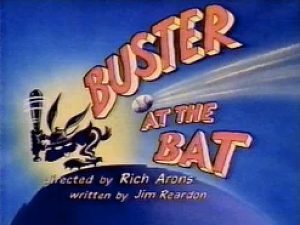 In the follow-up anthology, “Son of the Wacko World of Sports”, we find Buster at the Bat (2/12/91), where we get another adaptation of “Casey at the Bat”, not taking a great deal of liberties with the passages from the original verse, as narrated by Sylvester. But there are substantial cast changes, and some angles added between the verses. Acme Looniversity again plats Perfecto Prep, but this time, we stay with the game instead of visiting the bleachers. A caricature of Tommy Lasorda makes a brief appearance outside the Acme dugout, sipping from a paper cup which probably contains a dietary drink he was commercially plugging at the time, Slim-Fast. Perfecto cheats, though less blatantly than last time. Furrball, now a player, is prevented from reaching first by the catcher standing on the end of his tail. Fifi La Fume, who hasn;t reached first since 1988, keeps the catcher from throwing her out at first, just by the whiff of her aroma, which causes the catcher to collapse, and the ball to go into a coughing jag. Sweetie bird gets the usual walk from having too small a strike zone, bringing Buster’s turn up at bat. But Buster isn’t in the dugout. Instead, he is driven onto the field in a limousine by driver/bodyguard Arnold, and riding with him is Buster’s agent, Plucky Duck. Before going to bat, Buster insists on re-negotiating his contract with team coach Foghorn Leghorn. Plucky has a list of contract demands that unrolls like a scroll, including $100,000 for every single, $200,000 for every double, 10% of the parking receipts, and a candy bar named after him. As Foghorn signs the contract, he sarcastically asks, “When do you want to pick up my first-born?” Also, before stepping onto the field, Buster receives several offers of payment to wear various athletic shoes. Babs is the highest bidder for him to wear her shoes, at $3,000,000, and Buster appears in long stockings and high heels, remarking, “I usually wear flats”. (This is probably a poke at an ad from football player Joe Namath, who actually appeared with his legs in nylon stockings.)
In the follow-up anthology, “Son of the Wacko World of Sports”, we find Buster at the Bat (2/12/91), where we get another adaptation of “Casey at the Bat”, not taking a great deal of liberties with the passages from the original verse, as narrated by Sylvester. But there are substantial cast changes, and some angles added between the verses. Acme Looniversity again plats Perfecto Prep, but this time, we stay with the game instead of visiting the bleachers. A caricature of Tommy Lasorda makes a brief appearance outside the Acme dugout, sipping from a paper cup which probably contains a dietary drink he was commercially plugging at the time, Slim-Fast. Perfecto cheats, though less blatantly than last time. Furrball, now a player, is prevented from reaching first by the catcher standing on the end of his tail. Fifi La Fume, who hasn;t reached first since 1988, keeps the catcher from throwing her out at first, just by the whiff of her aroma, which causes the catcher to collapse, and the ball to go into a coughing jag. Sweetie bird gets the usual walk from having too small a strike zone, bringing Buster’s turn up at bat. But Buster isn’t in the dugout. Instead, he is driven onto the field in a limousine by driver/bodyguard Arnold, and riding with him is Buster’s agent, Plucky Duck. Before going to bat, Buster insists on re-negotiating his contract with team coach Foghorn Leghorn. Plucky has a list of contract demands that unrolls like a scroll, including $100,000 for every single, $200,000 for every double, 10% of the parking receipts, and a candy bar named after him. As Foghorn signs the contract, he sarcastically asks, “When do you want to pick up my first-born?” Also, before stepping onto the field, Buster receives several offers of payment to wear various athletic shoes. Babs is the highest bidder for him to wear her shoes, at $3,000,000, and Buster appears in long stockings and high heels, remarking, “I usually wear flats”. (This is probably a poke at an ad from football player Joe Namath, who actually appeared with his legs in nylon stockings.)
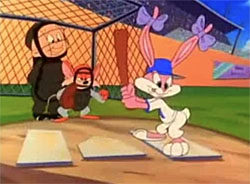 Buster selects a bat from the “Bat Boy”, who is something of a look-alike to Batman, with a rack of bats concealed behind the bat-emblem prominent upon his chest. Arnold again appears with the limousine, and drives Buster all of five feet from the dugout to home plate. Buster removes from one hand an impossible series of batting gloves, including a boxing glove and a knight’s metal glove with mace and chain attached. The poem begins to follow the original verse from here, with Buster ignoring one of the pitches while taking a call from his stockbroker to sell his bonds and invest in CD’s. A cute touch is added to the line when Sylvester states, “the multitude was awed”, as everyone reacts with a verbal “Awww….” as if viewing a cute puppy. Finally, the pivotal third pitch. The usual “somewhere” verse, and a return to the ball park – where Buster has – hit a HOME RUN??? Buster addresses the camera, pointing out he is the star of the show. You expected him to strike out? Babs appears again as a reporter, mimicking popular television commercials for Disneyland, and asking celebrity Buster what he’s going to do now after winning the big game. Buster holds up the sack of cash that he’s earned, and announces “I’m gonna build my own amusement park!”
Buster selects a bat from the “Bat Boy”, who is something of a look-alike to Batman, with a rack of bats concealed behind the bat-emblem prominent upon his chest. Arnold again appears with the limousine, and drives Buster all of five feet from the dugout to home plate. Buster removes from one hand an impossible series of batting gloves, including a boxing glove and a knight’s metal glove with mace and chain attached. The poem begins to follow the original verse from here, with Buster ignoring one of the pitches while taking a call from his stockbroker to sell his bonds and invest in CD’s. A cute touch is added to the line when Sylvester states, “the multitude was awed”, as everyone reacts with a verbal “Awww….” as if viewing a cute puppy. Finally, the pivotal third pitch. The usual “somewhere” verse, and a return to the ball park – where Buster has – hit a HOME RUN??? Buster addresses the camera, pointing out he is the star of the show. You expected him to strike out? Babs appears again as a reporter, mimicking popular television commercials for Disneyland, and asking celebrity Buster what he’s going to do now after winning the big game. Buster holds up the sack of cash that he’s earned, and announces “I’m gonna build my own amusement park!”
• “Buster At the Bat” is lead-off cartoon on Dailymotion.
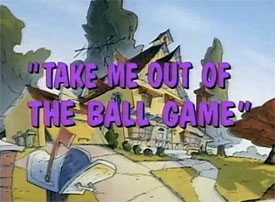 Take Me Out of the Ball Game (Disney, Goof Troop, 9/2/92) – Disney reusing the same title as a Ducktales episode within the small space of only a few years? Seems they should have a bit more originality than that. And yet, the episode itself is considerably fun and clever. It is Max’s birthday, and Goofy claims to have gotten him a special present. While Max envisions a new skateboard or a special video game, all he finds inside the box are a beat-up baseball, bat, and mitt – Goofy’s own from his old days as a ltttle leaguer. Goofy proposes a trip to the backyard, where he plans to teach his offspring to be every bit the ball player that he once was. Max does not consider himself the athletic type, nor has any great deal of confidence in the thought of his father being an instructor, so tries his best to dodge out on any excuse, but Goofy won’t be dissuaded. Goofy’s demonstration of base running tangles him up in everything in the backyard and lands him in the shrubbery. He sets up a batting tee for Max, and tells him to keep swinging, and sooner or later, the ball will get in the way. The advice works, and after several failed attempts, Max makes a lucky hit, snapping the ball off its string tether, and sailing it over the hedges, into the lemonade glass of Pete in the next yard. Pete never gets to vent his anger, when he hears that Max hit the long ball. Believing that anything a goof can do, his own son should be able to do too, he turns upon PJ (who has already been weeding the lawn for six hours at his father’s orders), and presses him into learning baseball like his old man as well. PJ is as poor and non-instinctive a player as Max, and slides right through the property-line fence on his first attempt, where Max finds out what PJ’s pop has him up to. Both boys begin to believe they’ll never see the end of this, and attempt to conspire among themselves to escape this rut.
Take Me Out of the Ball Game (Disney, Goof Troop, 9/2/92) – Disney reusing the same title as a Ducktales episode within the small space of only a few years? Seems they should have a bit more originality than that. And yet, the episode itself is considerably fun and clever. It is Max’s birthday, and Goofy claims to have gotten him a special present. While Max envisions a new skateboard or a special video game, all he finds inside the box are a beat-up baseball, bat, and mitt – Goofy’s own from his old days as a ltttle leaguer. Goofy proposes a trip to the backyard, where he plans to teach his offspring to be every bit the ball player that he once was. Max does not consider himself the athletic type, nor has any great deal of confidence in the thought of his father being an instructor, so tries his best to dodge out on any excuse, but Goofy won’t be dissuaded. Goofy’s demonstration of base running tangles him up in everything in the backyard and lands him in the shrubbery. He sets up a batting tee for Max, and tells him to keep swinging, and sooner or later, the ball will get in the way. The advice works, and after several failed attempts, Max makes a lucky hit, snapping the ball off its string tether, and sailing it over the hedges, into the lemonade glass of Pete in the next yard. Pete never gets to vent his anger, when he hears that Max hit the long ball. Believing that anything a goof can do, his own son should be able to do too, he turns upon PJ (who has already been weeding the lawn for six hours at his father’s orders), and presses him into learning baseball like his old man as well. PJ is as poor and non-instinctive a player as Max, and slides right through the property-line fence on his first attempt, where Max finds out what PJ’s pop has him up to. Both boys begin to believe they’ll never see the end of this, and attempt to conspire among themselves to escape this rut.
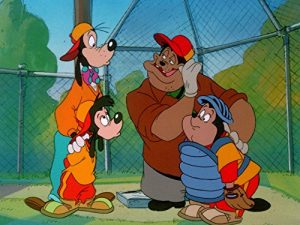 The boys feign a freak fielding accident, pretending they will be out of commission for the season – maybe two or more. But Pete promises to cure PJ’s ailment with his special liniment, while Goofy claims he can cure Max twice as fast with his special stretching exercise regimen. Both boys get the works, and have no choice but to claim they’ve made a miracle recovery. The boys, however, make a discovery in enduring the sounds of Goofy’s and Pete’s over-the-fence bickering. Both the fathers had been on the same little-league team (something PJ compares to a dog being teammates with his fleas), and each blames the other for losing a championship game (Pete, former catcher, claiming Goofy got his signals crossed up and threw the wrong pitches, and Goofy claiming it was Pete that got them mixed-op). The end result was that they finished out their little league days with Pete as water boy and Goofy as bat boy. So neither is the all-pro they have claimed to be. This news comes as little consolation, when the fathers disclose that their old little league coach is still coaching to this day, and tryouts for the league are tomorrow – something both fathers have been lining up their sons to engage in all the time of their training.
The boys feign a freak fielding accident, pretending they will be out of commission for the season – maybe two or more. But Pete promises to cure PJ’s ailment with his special liniment, while Goofy claims he can cure Max twice as fast with his special stretching exercise regimen. Both boys get the works, and have no choice but to claim they’ve made a miracle recovery. The boys, however, make a discovery in enduring the sounds of Goofy’s and Pete’s over-the-fence bickering. Both the fathers had been on the same little-league team (something PJ compares to a dog being teammates with his fleas), and each blames the other for losing a championship game (Pete, former catcher, claiming Goofy got his signals crossed up and threw the wrong pitches, and Goofy claiming it was Pete that got them mixed-op). The end result was that they finished out their little league days with Pete as water boy and Goofy as bat boy. So neither is the all-pro they have claimed to be. This news comes as little consolation, when the fathers disclose that their old little league coach is still coaching to this day, and tryouts for the league are tomorrow – something both fathers have been lining up their sons to engage in all the time of their training.
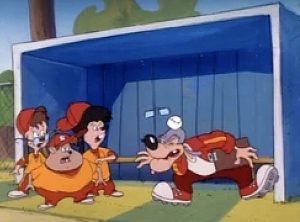 Try as they might, the boys can’t figure an angle to get themselves out of the tryouts. But, fortunately for them, Pete’s wife Peg intervenes, noting that the fathers have been acting more like doting mothers than a mother hen on a nest. She convinces the dads to give the kids some space, and let them attend the tryouts without parental oversight. The boys follow through and meet the coach, who, in his advanced age, is both crotchety and nearsighted. Even with blurred vision, he still recognizes the family resemblance of Max and PJ to their fathers, and thinks it’s the same two players he had to keep off the active team. The boys assure him they’re not their own dads, and the coach gives them a chance to show what they’ve got. What they’ve got is – nothing, and the coach ejects them from the field, suggesting they take up bowling or something. The boys trudge home, but find they haven’t the heart to break the news to their dads, who automatically assume they’ve made the team, and are too exhilarated for the boys to dare bust their bubble. So what to do, with the first game of the season looming? Max gets an idea – what the dads don’t see can’t hurt them. So, when game day arrives, both dads find the family cars blowing gaskets and unable to move an inch, causing the boys to take off by themselves to the game on bikes. And no wonder the cars wouldn’t go. Some mysterious someone has plugged the exhaust pipes of both vehicles with cement!
Try as they might, the boys can’t figure an angle to get themselves out of the tryouts. But, fortunately for them, Pete’s wife Peg intervenes, noting that the fathers have been acting more like doting mothers than a mother hen on a nest. She convinces the dads to give the kids some space, and let them attend the tryouts without parental oversight. The boys follow through and meet the coach, who, in his advanced age, is both crotchety and nearsighted. Even with blurred vision, he still recognizes the family resemblance of Max and PJ to their fathers, and thinks it’s the same two players he had to keep off the active team. The boys assure him they’re not their own dads, and the coach gives them a chance to show what they’ve got. What they’ve got is – nothing, and the coach ejects them from the field, suggesting they take up bowling or something. The boys trudge home, but find they haven’t the heart to break the news to their dads, who automatically assume they’ve made the team, and are too exhilarated for the boys to dare bust their bubble. So what to do, with the first game of the season looming? Max gets an idea – what the dads don’t see can’t hurt them. So, when game day arrives, both dads find the family cars blowing gaskets and unable to move an inch, causing the boys to take off by themselves to the game on bikes. And no wonder the cars wouldn’t go. Some mysterious someone has plugged the exhaust pipes of both vehicles with cement!
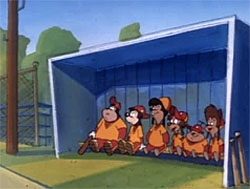 The boys hang out on the outskirts of the playing field, watching the game through binoculars so they accurately know the score and key plays of the game. They then return home to report on the team’s victory, while the dads are still trying to remove the cement from their tail pipes. Too much going on for the dads to pay full attention to the play-by-play description beyond that there was a victory, so Pete states that he’ll read all about it tomorrow in the sport pages. The sport pages? Something the boys didn’t figure on. So next morning, they are positioned at their respective front doors, armed with fishing nets to catch the morning paper as it is tossed toward their doorsteps. They take the papers up to Max’s bedroom, and snap photos of each other with an instant camera. A little cutting and pasting, and their faces appear as star players on the article about yesterday’s game. The dads are pleasantly satisfied as they read the story at breakfast.
The boys hang out on the outskirts of the playing field, watching the game through binoculars so they accurately know the score and key plays of the game. They then return home to report on the team’s victory, while the dads are still trying to remove the cement from their tail pipes. Too much going on for the dads to pay full attention to the play-by-play description beyond that there was a victory, so Pete states that he’ll read all about it tomorrow in the sport pages. The sport pages? Something the boys didn’t figure on. So next morning, they are positioned at their respective front doors, armed with fishing nets to catch the morning paper as it is tossed toward their doorsteps. They take the papers up to Max’s bedroom, and snap photos of each other with an instant camera. A little cutting and pasting, and their faces appear as star players on the article about yesterday’s game. The dads are pleasantly satisfied as they read the story at breakfast.
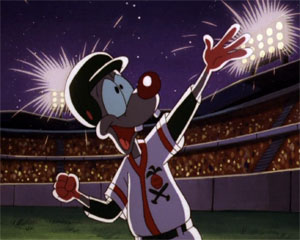 Now, all the boys have to do is keep this same thing up for all the weeks of the summer until the season ends. They continue to plan mechanical mishaps to their dads’ cars, doctor the morning papers, and chalk-off the passing weeks, until only a final championship game remains on the schedule. But the dads have a surprise up their sleeve that could mess up everything. Determined to see the last game with their sons, they hire a chauffeured limousine to accompany their sons to the field in style. And, since the boys have been playing so remarkably, the dads have telephoned a bevy of scouts from the big leagues to check out their skills on the field. There’s nowhere to hide, and Max figures their only remaining alternative is to sneak into the home team dugout, remain inconspicuous so the coach doesn’t notice them, and fool their dads into thinking they’re with the team. But, although the home team maintains a lead of several runs, Goofy and Pete refuse to understand why the coach is keeping his star players off the field. They confront the coach in the late innings. The nearsighted coach still believes he recognizes Max and PJ as the players he booted off the team at the beginning of the season, but Goofy and Pete convince him, “It was us you booted out – 30 years ago.” The befuddled coach admits at his age, everything runs together, so allows Max and PJ to take the field, in their dads’ old positions as pitcher and catcher. The boys perform as rotten as ever, and the fathers demand an explanation from them as to why they’re not playing up to their potential. The boys respond that they feel like they’ve lost something – and doubt they can find it again. Goofy gasps, “They’re in a slump”, and Pete remarks that it happens to the best of players. Only one way to save the championship. Knowing how nearsighted the coach is, Pete and Goofy borrow the ill-fitting uniforms of PJ and Max, and go onto the field in the next inning in their sons’ places.
Now, all the boys have to do is keep this same thing up for all the weeks of the summer until the season ends. They continue to plan mechanical mishaps to their dads’ cars, doctor the morning papers, and chalk-off the passing weeks, until only a final championship game remains on the schedule. But the dads have a surprise up their sleeve that could mess up everything. Determined to see the last game with their sons, they hire a chauffeured limousine to accompany their sons to the field in style. And, since the boys have been playing so remarkably, the dads have telephoned a bevy of scouts from the big leagues to check out their skills on the field. There’s nowhere to hide, and Max figures their only remaining alternative is to sneak into the home team dugout, remain inconspicuous so the coach doesn’t notice them, and fool their dads into thinking they’re with the team. But, although the home team maintains a lead of several runs, Goofy and Pete refuse to understand why the coach is keeping his star players off the field. They confront the coach in the late innings. The nearsighted coach still believes he recognizes Max and PJ as the players he booted off the team at the beginning of the season, but Goofy and Pete convince him, “It was us you booted out – 30 years ago.” The befuddled coach admits at his age, everything runs together, so allows Max and PJ to take the field, in their dads’ old positions as pitcher and catcher. The boys perform as rotten as ever, and the fathers demand an explanation from them as to why they’re not playing up to their potential. The boys respond that they feel like they’ve lost something – and doubt they can find it again. Goofy gasps, “They’re in a slump”, and Pete remarks that it happens to the best of players. Only one way to save the championship. Knowing how nearsighted the coach is, Pete and Goofy borrow the ill-fitting uniforms of PJ and Max, and go onto the field in the next inning in their sons’ places.
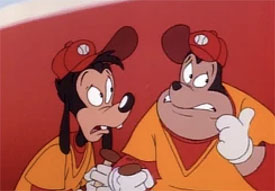 30 years haven’t improved the skills of the dads, and they still can’t get their signals straight as to Goofy’s pitches. Several runs quickly score against them as Goofy delivers up the ball right into the hitting zone of the batters. Goofy also hits three batters in a row, then misinterprets Pete’s signal as “side ball in the corner pocket”, causing him to wild-pitch the ball into the jersey pocket of the coach. While Goofy and Pete turn the coach upside down to find the lost ball, the opponents score the winning run on a grand slam wild pitch. Nearsignted or no, the coach knows of only two players who could mess up a play that badly – Goofy and Pete. He boots both of them over the fence (tearing the seat of Goofy’s trousers), and announcing that they are forever banned from baseball. “Don’t even watch it on TV, or trade baseball cards, or eat bubble gum.” Back at home that evening, Goofy looks at his boxer shorts showing through the hole in his trousers, and remarks that now he knows how Shoeless Joe Jackson must have felt. However, Pete is still optimistic. There’s always football season, just around the corner. PJ and Max can see where this is leading, and end the film by clamoring their way out through the closing iris, and exiting the frame pronto.
30 years haven’t improved the skills of the dads, and they still can’t get their signals straight as to Goofy’s pitches. Several runs quickly score against them as Goofy delivers up the ball right into the hitting zone of the batters. Goofy also hits three batters in a row, then misinterprets Pete’s signal as “side ball in the corner pocket”, causing him to wild-pitch the ball into the jersey pocket of the coach. While Goofy and Pete turn the coach upside down to find the lost ball, the opponents score the winning run on a grand slam wild pitch. Nearsignted or no, the coach knows of only two players who could mess up a play that badly – Goofy and Pete. He boots both of them over the fence (tearing the seat of Goofy’s trousers), and announcing that they are forever banned from baseball. “Don’t even watch it on TV, or trade baseball cards, or eat bubble gum.” Back at home that evening, Goofy looks at his boxer shorts showing through the hole in his trousers, and remarks that now he knows how Shoeless Joe Jackson must have felt. However, Pete is still optimistic. There’s always football season, just around the corner. PJ and Max can see where this is leading, and end the film by clamoring their way out through the closing iris, and exiting the frame pronto.
• “Take Me Out Of the Ball Game” is on Dailymotion.
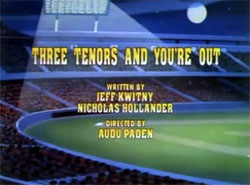 Three Tenors and Your Out (Warner/Spielberg, Slappy Squirrel (from Animaniacs) – 9/16/95) – Slappy has been promising Skippy to take him to a Dodger game all summer, and Skippy is ready to eat Dodger Dogs until he barfs. Wouldn’t you know, Slappy would choose a night when the Dodgers aren’t playing, and the event at the stadium is instead a celebrated concert event of the past – the renown appearances together of the world’s most acclaimed opera singers, “The Three Tenors” (Pavarotti, Carreras, and Domingo, each parodied in names close to their own within the cartoon.) Seeing their faces displayed on a banner over the stadium entrance, Skippy asks, “Who are these guys?” Slappy speculates that they are the new infield for the Montreal Expos.
Three Tenors and Your Out (Warner/Spielberg, Slappy Squirrel (from Animaniacs) – 9/16/95) – Slappy has been promising Skippy to take him to a Dodger game all summer, and Skippy is ready to eat Dodger Dogs until he barfs. Wouldn’t you know, Slappy would choose a night when the Dodgers aren’t playing, and the event at the stadium is instead a celebrated concert event of the past – the renown appearances together of the world’s most acclaimed opera singers, “The Three Tenors” (Pavarotti, Carreras, and Domingo, each parodied in names close to their own within the cartoon.) Seeing their faces displayed on a banner over the stadium entrance, Skippy asks, “Who are these guys?” Slappy speculates that they are the new infield for the Montreal Expos.
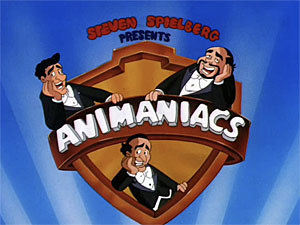 Once inside, the conductor of the symphony orchestra underscoring the event prepares to play the National Anthem, but is briefly disturbed by a handshake from Yakko Warner and a kiss from Dot, delivered in silhouette in the manner of Mickey Mouse’s handshake with Stokowski in “Fantasia”. One line before the Anthem is over, over-anxious Slappy yells out, “Play ball!”, and gets shushed by the crowd. Then onto the stage come the tenors. Slappy suspects they are umpires, but can’t figure out the reason for their breaking into song. Skippy soon begins to think she must be wrong, and Slappy takes a closer look, particularly at the portly equivalent of Pavarotti – and realizes her mistake. “That’s Tommy Lasorda”, she exclaims. She playfully shouts out. “Hey, Tommy! Better get back on the Slim-Fast. You’re losing the war”, and also tells him to shave that beard. The singing continues, with the crowd in the stands standing to applaud each time one of the singers completes a short passage. “Up, down, up, down”, complains Slappy. “What is this, a Jane Fonda workout?” The singing continues, with a lyric to the “Dance of the Hours” consisting entirely of the names of Italian food. Slappy finds this pre-game show to be lasting an eternity. Getting hungry, she scans the aisles for a peanut vendor, but can find none. “Peanuts!” she repeatedly shouts, each time louder and louder, until the Pavarotti clone can barely sing above it. “Solo Mio! Somebody getta her some peanuts”, he shouts. Suddenly, Slappy and Skippy are deluged in a mountain of peanuts from nowhere, and respond, “That’s more like it.”
Once inside, the conductor of the symphony orchestra underscoring the event prepares to play the National Anthem, but is briefly disturbed by a handshake from Yakko Warner and a kiss from Dot, delivered in silhouette in the manner of Mickey Mouse’s handshake with Stokowski in “Fantasia”. One line before the Anthem is over, over-anxious Slappy yells out, “Play ball!”, and gets shushed by the crowd. Then onto the stage come the tenors. Slappy suspects they are umpires, but can’t figure out the reason for their breaking into song. Skippy soon begins to think she must be wrong, and Slappy takes a closer look, particularly at the portly equivalent of Pavarotti – and realizes her mistake. “That’s Tommy Lasorda”, she exclaims. She playfully shouts out. “Hey, Tommy! Better get back on the Slim-Fast. You’re losing the war”, and also tells him to shave that beard. The singing continues, with the crowd in the stands standing to applaud each time one of the singers completes a short passage. “Up, down, up, down”, complains Slappy. “What is this, a Jane Fonda workout?” The singing continues, with a lyric to the “Dance of the Hours” consisting entirely of the names of Italian food. Slappy finds this pre-game show to be lasting an eternity. Getting hungry, she scans the aisles for a peanut vendor, but can find none. “Peanuts!” she repeatedly shouts, each time louder and louder, until the Pavarotti clone can barely sing above it. “Solo Mio! Somebody getta her some peanuts”, he shouts. Suddenly, Slappy and Skippy are deluged in a mountain of peanuts from nowhere, and respond, “That’s more like it.”
The squirrels continue to be bored stiff, until Slappy pulls out a remote control to “see what else is on” on the DiamondVision big screen. She tunes in an ersatz Droopy cartoon, the Andy Griffith Show, and a Yankees game in progress, until the tenors gang up on her and toss both her and Skippy out of the stadium. It’s time for some full-fledged war, and Slappy’s renewed promise that Skippy will see a baseball game.
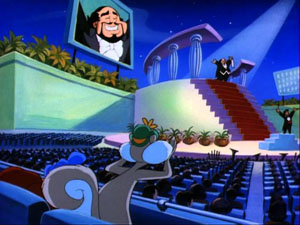 Things get pretty silly in the second half. The squirrels switch music on the singers and orchestra, replacing “Singing in the Rain” with their own composition, “Slipping On the Ice”, complete with frozen floor and special effects. Slappy drops the conductor through a trap door and takes his place, while Skippy tells the singers it’s time for a costume change – into the outfits of three clowns from “I Pagliacci”. But the lyric sheets they have received from Skippy are for the Carnen Toreador Song, with new words consisting of a list of the names of all-time great ball players. Skippy appears out of another trap door in the stage, playing the stadiim organ, and forcing the tenors to cover by joining in a rendition of “Take Me Out To the Ball Game.” Then things really get ridiculous. Slappy arrives overhead, along with Steven Spielberg, in a flying saucer from “Close Encounters of the Third Kind”. Lights and synthesizer sounds from the bottom of the ship start playing a musical game of “Simon” with each tenor, increasing the pitch of the tones higher and higher until their voices crack. Pavarotti is the last man standing, and matches the highest note, but only with a mighty inhale and exhale that leaves him deflating like a balloon, flying all over the stadium. Slappy, now in the announcer’s booth, provides commentary on the “long fly”, ending with “That butterball is outta here.” So what can the tenors and orchestra ultimately do? Just what Slappy wants – stage a baseball game, to give Skippy something to see. Skippy catches a foul ball as a souvenir, and Slappy closes with her usual catch-phrase: “Now that’s comedy!”
Things get pretty silly in the second half. The squirrels switch music on the singers and orchestra, replacing “Singing in the Rain” with their own composition, “Slipping On the Ice”, complete with frozen floor and special effects. Slappy drops the conductor through a trap door and takes his place, while Skippy tells the singers it’s time for a costume change – into the outfits of three clowns from “I Pagliacci”. But the lyric sheets they have received from Skippy are for the Carnen Toreador Song, with new words consisting of a list of the names of all-time great ball players. Skippy appears out of another trap door in the stage, playing the stadiim organ, and forcing the tenors to cover by joining in a rendition of “Take Me Out To the Ball Game.” Then things really get ridiculous. Slappy arrives overhead, along with Steven Spielberg, in a flying saucer from “Close Encounters of the Third Kind”. Lights and synthesizer sounds from the bottom of the ship start playing a musical game of “Simon” with each tenor, increasing the pitch of the tones higher and higher until their voices crack. Pavarotti is the last man standing, and matches the highest note, but only with a mighty inhale and exhale that leaves him deflating like a balloon, flying all over the stadium. Slappy, now in the announcer’s booth, provides commentary on the “long fly”, ending with “That butterball is outta here.” So what can the tenors and orchestra ultimately do? Just what Slappy wants – stage a baseball game, to give Skippy something to see. Skippy catches a foul ball as a souvenir, and Slappy closes with her usual catch-phrase: “Now that’s comedy!”
• A brief clip from “Three Tenors and Your Out” is on Facebook.
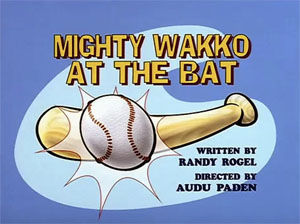 Mighty Wakko At the Bat (Warner/Spielberg, Animaniacs, 9/14/96) is a real All-Star game for virtually the entire cast of Animaniacs, every character of its various segments seeming to cameo in at least one shot. It follows the meter of “Casey at the Bat”, but deviates greatly from the text, more or less writing its own story. Studio boss Plotz acts as manager of the Warner team in a championship game against a human team simply identified on the scoreboard as the “Gorillas” (presumably, a retrospective reference to the Gas House Gorillas of “Baseball Bugs”’s day – it’s not the only retro reference, as a billboard on one of the fences advertises a soda pop called “Frelling Friz”). Plotz knows how to spark a rally – he announces that either the team wins the game, or no one’s getting paid. Dr. Scrachensniff is first at bat, and lets three strikes whiz by, one after another, without even swinging. Pesto of the Goodfeathers makes contact with the ball, but is stomped on by the cleats of the first baseman, and called out. Hot-tempered Pesto engages in a war of words with the umpire, which erupts in fisticuffs, leaving the umpire prone and unconscious on the ground, while the other Goodfeathers drag Pesto away. A ray of luck comes from the batting lineup, as the team’s power hitter, Ralph the guard, advances to the plate. Ralph has so much power, his grip on the bat splits and nearly shatters his oversize massive bat in two. But for all his brawn, nothing comes of it but a single, as he gets beaned right between the eyes, and is carried off on a stretcher, while Skippy Squirrel takes his place as base runner. So who’s next? Little Wakko Warner, who seems barely able to drag the bat along the ground. The crowd and opposing team laugh themselves silly, calling him “just a kid”. But, to everyone’s surprise, Wakko hits a high, fly ball, except not far enough to get out of the park. Two fielders set up easy chairs in center field, waiting patiently for the ball to come down to make the final out. But their attention is diverted, as the series’ two seductresses, Minerva Mink and Hello Nurse, appear before the fielders, throwing them a “curve” ball by coyly stating, “Hello, Boys.” The fielders go gaga in standard cartoon form, one with heart beating visibly out of his chest, the other “losing his head” literally, tossing it from one hand to another, as the ball drops unnoticed behind them. Skippy scores the tying run, while Wakko rounds the bases. The ball is tossed to the catcher for a tag, and Wakko goes into a slide. A massive mound of dirt is plowed up at the plate, as everyone awaits the umpire’s call (allowing for the “Somewhere men are laughing” bit). But there seems to be no joy in Burbank, as the umpire calls an out – until Wakko appears under home plate amidst the dirt pile, and the ump changes his call to safe. Wakko is carried off the field by his victorious team, and says to the camera, “Don’t you just love happy endings?” In a sort of Porky Pig ending, Mindy appears in the closing iris, waving to the camera with her usual brainless reflexive farewell statement: “Okay, I love ya. Bye-bye!”
Mighty Wakko At the Bat (Warner/Spielberg, Animaniacs, 9/14/96) is a real All-Star game for virtually the entire cast of Animaniacs, every character of its various segments seeming to cameo in at least one shot. It follows the meter of “Casey at the Bat”, but deviates greatly from the text, more or less writing its own story. Studio boss Plotz acts as manager of the Warner team in a championship game against a human team simply identified on the scoreboard as the “Gorillas” (presumably, a retrospective reference to the Gas House Gorillas of “Baseball Bugs”’s day – it’s not the only retro reference, as a billboard on one of the fences advertises a soda pop called “Frelling Friz”). Plotz knows how to spark a rally – he announces that either the team wins the game, or no one’s getting paid. Dr. Scrachensniff is first at bat, and lets three strikes whiz by, one after another, without even swinging. Pesto of the Goodfeathers makes contact with the ball, but is stomped on by the cleats of the first baseman, and called out. Hot-tempered Pesto engages in a war of words with the umpire, which erupts in fisticuffs, leaving the umpire prone and unconscious on the ground, while the other Goodfeathers drag Pesto away. A ray of luck comes from the batting lineup, as the team’s power hitter, Ralph the guard, advances to the plate. Ralph has so much power, his grip on the bat splits and nearly shatters his oversize massive bat in two. But for all his brawn, nothing comes of it but a single, as he gets beaned right between the eyes, and is carried off on a stretcher, while Skippy Squirrel takes his place as base runner. So who’s next? Little Wakko Warner, who seems barely able to drag the bat along the ground. The crowd and opposing team laugh themselves silly, calling him “just a kid”. But, to everyone’s surprise, Wakko hits a high, fly ball, except not far enough to get out of the park. Two fielders set up easy chairs in center field, waiting patiently for the ball to come down to make the final out. But their attention is diverted, as the series’ two seductresses, Minerva Mink and Hello Nurse, appear before the fielders, throwing them a “curve” ball by coyly stating, “Hello, Boys.” The fielders go gaga in standard cartoon form, one with heart beating visibly out of his chest, the other “losing his head” literally, tossing it from one hand to another, as the ball drops unnoticed behind them. Skippy scores the tying run, while Wakko rounds the bases. The ball is tossed to the catcher for a tag, and Wakko goes into a slide. A massive mound of dirt is plowed up at the plate, as everyone awaits the umpire’s call (allowing for the “Somewhere men are laughing” bit). But there seems to be no joy in Burbank, as the umpire calls an out – until Wakko appears under home plate amidst the dirt pile, and the ump changes his call to safe. Wakko is carried off the field by his victorious team, and says to the camera, “Don’t you just love happy endings?” In a sort of Porky Pig ending, Mindy appears in the closing iris, waving to the camera with her usual brainless reflexive farewell statement: “Okay, I love ya. Bye-bye!”
• “Mighty Wakko At the Bat” is on Dailymotion.
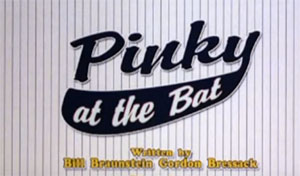 Pinky At the Bat (Warner/Spielberg, Pinky and the Brain, 11/22/97) – Quite a bit of a stretch (not necessarily of the 7th inning variety) in the usual plans to take over the world for the megalomaniac rodents this time. Brain’s latest scheme is to disrupt world economy by preventing people from spending money, by enveloping the world in a leather-repelling mist to keep them from reaching for their wallets. Pinky questions this plan, wondering what happens with the people who have vinyl wallets? Brain has no concern over this detail – people with vinyl wallets by definition have no money. The one catch to Brain’s plan is that he needs to be at the right place at the right time under the right atmospheric conditions, in order for his mist to properly disperse and envelop the globe. By his calculations, this will require him to be present at 10:00 p.m. on October 2nd, directly upon the pitcher’s mound at the stadium of the baseball expansion team, the New Hampshire Pineapples. In order to be there, Brain poses as Sparky LaBraina, offering services as player/manager, with Pinky passed off as Pinky Rodriguez. They appear before team owner George Beanstainer (word play on notorious Yankees owner George Sreinbrenner), who has just fired his existing manager in customary fashion for having three years of non-stop losses. George asks how come the mice are so small, and Brain ad-libs that they come from the Diminutive Republic. Brain lets slip a line about wanting to conquer the world – and Beanstainer completes his sentence: “Series?” That’s the positive thinking Beanstainer wants, and the mice are hired.
Pinky At the Bat (Warner/Spielberg, Pinky and the Brain, 11/22/97) – Quite a bit of a stretch (not necessarily of the 7th inning variety) in the usual plans to take over the world for the megalomaniac rodents this time. Brain’s latest scheme is to disrupt world economy by preventing people from spending money, by enveloping the world in a leather-repelling mist to keep them from reaching for their wallets. Pinky questions this plan, wondering what happens with the people who have vinyl wallets? Brain has no concern over this detail – people with vinyl wallets by definition have no money. The one catch to Brain’s plan is that he needs to be at the right place at the right time under the right atmospheric conditions, in order for his mist to properly disperse and envelop the globe. By his calculations, this will require him to be present at 10:00 p.m. on October 2nd, directly upon the pitcher’s mound at the stadium of the baseball expansion team, the New Hampshire Pineapples. In order to be there, Brain poses as Sparky LaBraina, offering services as player/manager, with Pinky passed off as Pinky Rodriguez. They appear before team owner George Beanstainer (word play on notorious Yankees owner George Sreinbrenner), who has just fired his existing manager in customary fashion for having three years of non-stop losses. George asks how come the mice are so small, and Brain ad-libs that they come from the Diminutive Republic. Brain lets slip a line about wanting to conquer the world – and Beanstainer completes his sentence: “Series?” That’s the positive thinking Beanstainer wants, and the mice are hired.
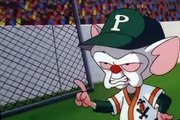 Brain first tries a pep talj to the team, falling back on every old cliche phrase he can think of, but substituting ponderous words in place of common ones (”It hasn’t concluded until there is closure.” “When the going gets tough, the tough get more committed to their ultimate objective.”) His talking leaves the team members saying, “Huh?”, and instead of respect, Brain winds up stuck in wads of the players’ discarded chewing gum as they step from the dugout. Announcer Van Spooney (a fairly poor voice impersonation of Vin Scully) promotes Farmer Ron pork fat pineapple dogs during the broadcast. Brain comes to bat, bit is pounded head-on by the ball as a hit batter. Nobody seems to notice where Brain is, as a pinch runner is sent in for him. Brain himself is stuck to the ball, and gets squeezed around in the pitcher’s mitt, then let fly with the ball at the next batter. The batter connects, down the third base line. Just before reaching third, the ball and Brain disconnect from one another, and the baseman catches Brain in his mitt, while the ball bounces into left field. The baseman tries to get an out at home, tossing quickly with a throw the umpire at first calls as an out – but the voice of Brain is heard from the catcher’s mitt: “I AM NOT A BALL!” The runner is called safe, and the Pineapples win their first game, on what the announcer calls “a real sacrifice play” by LaBraina. In another parody of the Disneyland “What are you going to do now?” commercials, Brain responds to said question from the press, “I’m going to the emergency room.”
Brain first tries a pep talj to the team, falling back on every old cliche phrase he can think of, but substituting ponderous words in place of common ones (”It hasn’t concluded until there is closure.” “When the going gets tough, the tough get more committed to their ultimate objective.”) His talking leaves the team members saying, “Huh?”, and instead of respect, Brain winds up stuck in wads of the players’ discarded chewing gum as they step from the dugout. Announcer Van Spooney (a fairly poor voice impersonation of Vin Scully) promotes Farmer Ron pork fat pineapple dogs during the broadcast. Brain comes to bat, bit is pounded head-on by the ball as a hit batter. Nobody seems to notice where Brain is, as a pinch runner is sent in for him. Brain himself is stuck to the ball, and gets squeezed around in the pitcher’s mitt, then let fly with the ball at the next batter. The batter connects, down the third base line. Just before reaching third, the ball and Brain disconnect from one another, and the baseman catches Brain in his mitt, while the ball bounces into left field. The baseman tries to get an out at home, tossing quickly with a throw the umpire at first calls as an out – but the voice of Brain is heard from the catcher’s mitt: “I AM NOT A BALL!” The runner is called safe, and the Pineapples win their first game, on what the announcer calls “a real sacrifice play” by LaBraina. In another parody of the Disneyland “What are you going to do now?” commercials, Brain responds to said question from the press, “I’m going to the emergency room.”
The season progresses, and Brain somehow manages to put the team on the road to victory after victory. He’s even written his own version of “Take Me Out To the Ball Game” for the 7th inning stretch, “Make Me the Whole World’s Leader.” But Brain isn’t a genius manager for nothing, and he can see that having Pinky in the lineup is a liability. So, he talks Pinky into a new “position” on the team, as bench warmer. Pinky adapts to this new role with dedication, covering the bench with warm, comfortable pillows to fulfill his task. When he begins to grow weary of the job, Brain modifies his responsibilities, adding to his chores the removal of splinters from the woorwork. Brain collects the wooden shards with a will, and even uses them cemented together to create his own custom bat, which he names in etched letters, “Wonderpoit”.
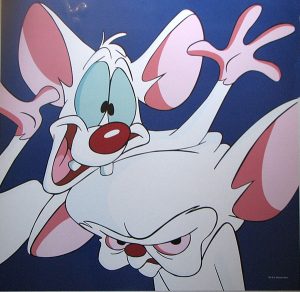 The crucial game on October 2 arrives. As 10:00 p.m. approaches, Brain can see a problem. The game is going too long. How to end it in a hurry, so he is free to be on the pitcher’s mound to spread his repellant mist, which he has brought to the stadium in a perfume atomizer spray bottle. Well, there’s one sure way to end their last turn at bat fast – victory be darned. Send in Pinky as a pinch hitter, with instructions not to swing unless Brain waves his hands – something he promises in advance not to do. An instant strikeout guaranteed. Ah, fickle dame fortune. Just before stepping out of the dugout, Pinky’s new bat, resting near the atomizer, is accidentally spritzed with the leather repellant, by the toe of a player returning to the dugout accidentally stepping on the squeeze bulb of the bottle. Brain realizes the mistake too late to stop Pinky from taking his place at the plate. Brain briefly speculates, then again, Pinky might with the help of the potion hit a home run. No, he concludes – after all, this is Pinky. So Brain does what he promised not to do – wave his arms at Pinky, in attempt to get him to come back. Pinky interprets this as the signal to swing, and does. The bat never touches the ball, but the repellant does its work, sending the ball on a fast trip deep out into space. The Pineapples win. Brain sees over a fill minute left on the clock before dispensal time, and drags the bottle out onto the field. But, his jubilant teammates pick him up off the grass, and carry him to the locker room on their shoulders, despite his desperate protests. 10:00 p.m. comes and goes, with no mist sprayed.
The crucial game on October 2 arrives. As 10:00 p.m. approaches, Brain can see a problem. The game is going too long. How to end it in a hurry, so he is free to be on the pitcher’s mound to spread his repellant mist, which he has brought to the stadium in a perfume atomizer spray bottle. Well, there’s one sure way to end their last turn at bat fast – victory be darned. Send in Pinky as a pinch hitter, with instructions not to swing unless Brain waves his hands – something he promises in advance not to do. An instant strikeout guaranteed. Ah, fickle dame fortune. Just before stepping out of the dugout, Pinky’s new bat, resting near the atomizer, is accidentally spritzed with the leather repellant, by the toe of a player returning to the dugout accidentally stepping on the squeeze bulb of the bottle. Brain realizes the mistake too late to stop Pinky from taking his place at the plate. Brain briefly speculates, then again, Pinky might with the help of the potion hit a home run. No, he concludes – after all, this is Pinky. So Brain does what he promised not to do – wave his arms at Pinky, in attempt to get him to come back. Pinky interprets this as the signal to swing, and does. The bat never touches the ball, but the repellant does its work, sending the ball on a fast trip deep out into space. The Pineapples win. Brain sees over a fill minute left on the clock before dispensal time, and drags the bottle out onto the field. But, his jubilant teammates pick him up off the grass, and carry him to the locker room on their shoulders, despite his desperate protests. 10:00 p.m. comes and goes, with no mist sprayed.
For all his efforts, Brain finds himself booted out of the executive office by Beanstainer, in spite of producing a winning season. “Firing is what I do. Deal with it”, shouts Beanstainer. And so, the thwarted mice head back to ACME Labs, ready to face tomorrow night and another plan to take over the world – after attempting to cure their mutual cases of athlete’s feet.
• “Pinky At the Bat” is on Internet Archive.
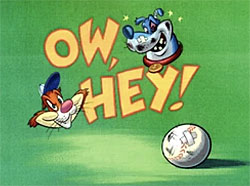 Ow, Hey! (Disney, Shnookums and Meat, 1/9/95) – “The Shnookums and Meat Funny Cartoon Show”, for whatever effort went into it, just wasn’t Disney’s forte. First, an awful sounding series title, that seemed destined from the start to fail to deliver on its verbal promise. While the actual films aren’t all that bad, they have repeated difficulty in living up to their concept or potential. The series’ characters, a cat and dog team, are generated in the obvious wake of Ren and Stimpy, and seem to try to blend a fairly mild dose of Kricfalusi with four parts of Tex Avery (attempting to follow in the mold of Roger Rabbit). However, unlike the Spielberg crew producing the theatrical Roger shorts, or even the modern-day abilities of Paul Rudish on the recent television Mickey Mouse cartoons, Disney just didn’t assign its “A” team to this project – and it shows. Pacing on this one is very uneven, alternating between slow establishing or exposition sequences that seem to take comparatively forever to get through to reach the gags (almost reminding one of very early Chuck Jones work on a bad day), and rapid-fire bursts of gag action, which, if they could have maintained the pace throughout the cartoon, might have held the production together. For the periodic smiles it generates, it still feels like a considerable disappointment – which likely accounts for why the short-term series in general failed to catch on, and lasted only 13 episodes.
Ow, Hey! (Disney, Shnookums and Meat, 1/9/95) – “The Shnookums and Meat Funny Cartoon Show”, for whatever effort went into it, just wasn’t Disney’s forte. First, an awful sounding series title, that seemed destined from the start to fail to deliver on its verbal promise. While the actual films aren’t all that bad, they have repeated difficulty in living up to their concept or potential. The series’ characters, a cat and dog team, are generated in the obvious wake of Ren and Stimpy, and seem to try to blend a fairly mild dose of Kricfalusi with four parts of Tex Avery (attempting to follow in the mold of Roger Rabbit). However, unlike the Spielberg crew producing the theatrical Roger shorts, or even the modern-day abilities of Paul Rudish on the recent television Mickey Mouse cartoons, Disney just didn’t assign its “A” team to this project – and it shows. Pacing on this one is very uneven, alternating between slow establishing or exposition sequences that seem to take comparatively forever to get through to reach the gags (almost reminding one of very early Chuck Jones work on a bad day), and rapid-fire bursts of gag action, which, if they could have maintained the pace throughout the cartoon, might have held the production together. For the periodic smiles it generates, it still feels like a considerable disappointment – which likely accounts for why the short-term series in general failed to catch on, and lasted only 13 episodes.
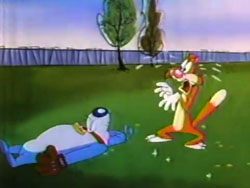 Our heroes relax on a summer day in the backyard, until Meat (the dog) suggests they get some exercise by batting around the old baseball. Shnookums rummages in an old storage chest for baseball supplies (the animators trying for an Avery gag by having him toss out from the chest virtually everything but baseball stuff), then the two finally settle into play mode, with Meat choosing to catch while Shnookums hits flies. The one problem is, every time Meat claims he’s ready to catch Shnookums’ best shot, he gets brained in the head in one way or another. (Ball leaves crater in his eye socket – bounces off center of cranium – scrunches inward his nose – hits on back of his head, driving loose neck skin forward over his snout – knocks his head a full foot to the right of his neck joint – hits him from the rear again, bugging his eyes out – etc.) Meat frequently responds with a shout of “Ow, Hey!” (hence, the title of the episode). While Shnookums continues to ask if Meat is okay, Meat remains a stubborn glutton for punishment, insisting he’s ready now for the next one from Shnookums’ bat. Shnookums finally decides to show Meat a little mercy, and instead of swinging, gently bunts a ball Meat’s way. In a gag of measured slowness, which again might have benefitted from tighter pacing, the ball takes its long, lazy time in reaching Meat, proceeding in litte baby bounces toward the dog’s waiting mitt. Just before the ball can roll to a stop at the edge of Meat’s glove, a set of sprinkler heads rise from the backyard grass, read to irrigate the lawn on a timer. One rises directly under the baseball, and as the water jets out, again drives the ball straight into Meat’s face for another blow, then rebounds off the dog high into the air, setting it bouncing across town. The ball enters the door of a concert hall, bouncing off the heads of most of the orchestra members on stage (including one noticeable character who laughs in a sound-alike manner to Tex Acery’s own deep hearty laugh in “Hamateur Night”, “The Penguin Parade”, and “The Bear’s Tale”, among others, in a direct homage to the gag king). The ball exits the hall, smashes a few warehouse windows on its way to the docks, and finally bounces into the open muzzle of one of the naval guns on board a battleship. (Always include a battleship or ocean liner when homaging Avery.) The gun turret turns seaward, and the cannon is fired, sending the ball into outer space. It catches upon the curve of a crescent moon, and makes a u-turn back toward Earth, achieving the re-emtry speed of a flaming comet. Meat meanwhile has reached a state of delirium, and is wobbling his way in circles around the yard, talking in total gibberish, when the ball finally makes touch-down, again smack on his head, with the impact of an atomic mushroom cloud.
Our heroes relax on a summer day in the backyard, until Meat (the dog) suggests they get some exercise by batting around the old baseball. Shnookums rummages in an old storage chest for baseball supplies (the animators trying for an Avery gag by having him toss out from the chest virtually everything but baseball stuff), then the two finally settle into play mode, with Meat choosing to catch while Shnookums hits flies. The one problem is, every time Meat claims he’s ready to catch Shnookums’ best shot, he gets brained in the head in one way or another. (Ball leaves crater in his eye socket – bounces off center of cranium – scrunches inward his nose – hits on back of his head, driving loose neck skin forward over his snout – knocks his head a full foot to the right of his neck joint – hits him from the rear again, bugging his eyes out – etc.) Meat frequently responds with a shout of “Ow, Hey!” (hence, the title of the episode). While Shnookums continues to ask if Meat is okay, Meat remains a stubborn glutton for punishment, insisting he’s ready now for the next one from Shnookums’ bat. Shnookums finally decides to show Meat a little mercy, and instead of swinging, gently bunts a ball Meat’s way. In a gag of measured slowness, which again might have benefitted from tighter pacing, the ball takes its long, lazy time in reaching Meat, proceeding in litte baby bounces toward the dog’s waiting mitt. Just before the ball can roll to a stop at the edge of Meat’s glove, a set of sprinkler heads rise from the backyard grass, read to irrigate the lawn on a timer. One rises directly under the baseball, and as the water jets out, again drives the ball straight into Meat’s face for another blow, then rebounds off the dog high into the air, setting it bouncing across town. The ball enters the door of a concert hall, bouncing off the heads of most of the orchestra members on stage (including one noticeable character who laughs in a sound-alike manner to Tex Acery’s own deep hearty laugh in “Hamateur Night”, “The Penguin Parade”, and “The Bear’s Tale”, among others, in a direct homage to the gag king). The ball exits the hall, smashes a few warehouse windows on its way to the docks, and finally bounces into the open muzzle of one of the naval guns on board a battleship. (Always include a battleship or ocean liner when homaging Avery.) The gun turret turns seaward, and the cannon is fired, sending the ball into outer space. It catches upon the curve of a crescent moon, and makes a u-turn back toward Earth, achieving the re-emtry speed of a flaming comet. Meat meanwhile has reached a state of delirium, and is wobbling his way in circles around the yard, talking in total gibberish, when the ball finally makes touch-down, again smack on his head, with the impact of an atomic mushroom cloud.
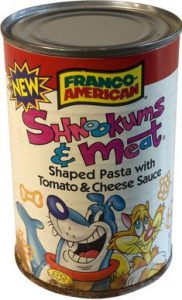 The second half of the episode has little or nothing to do with baseball. Shnookums finally will not take a no for an answer – Meat needs medical attention. Though he has no idea how to drive (he even has to deduce that he actually needs to insert a key before the car will move), he commandeers the family sedan to rush Meat to the vet. He is barely able to reach the gas pedal with his paw, but when he does, hurtles forward at full speed instead of in reverse gear, crashing through the home’s garage and out its back wall onto the main road. He suggests that Meat looks like he could use a little air, and pushes Meat’s head out the window to catch the breeze in his face like dogs are prone to do. Except Shnookums drives too close to the road’s shoulder, causing Meat’s head to smack into every one of a string of numerous road signs along the highway. The car finally wends its way at breakneck speed through city streets, and crashes into the pet hospital building, weakening the building’s foundation, and causing it to generally droop by about several stories in height. A dissolve to note a brief passage of time, and the two emerge from the hospital door upon completion of their treatment. All Meat has needed was a pair of band-aids upon his nose. But Shnookums is in complete traction, with neck and body braces, immobilized in a wheelchair. While Meat remarks at the marvels of medical science, he allows the wheelchair to escape from his grasp, sending Shnookums on a full speed roll down a steep hill, toward a precipice, and off a cliff, with Meat following in pursuit. The film ends with a scoping shot as the camera disappears down Shnookums’s screaming throat as he falls, followed by a peculiar cutaway via iris to a character from nowhere, Seymour Fortescue, the Safety Chinchilla, who wears protective pillows on his head and feet, and warns the kids that 90 percent of accidents happen around the home – so, watch it.
The second half of the episode has little or nothing to do with baseball. Shnookums finally will not take a no for an answer – Meat needs medical attention. Though he has no idea how to drive (he even has to deduce that he actually needs to insert a key before the car will move), he commandeers the family sedan to rush Meat to the vet. He is barely able to reach the gas pedal with his paw, but when he does, hurtles forward at full speed instead of in reverse gear, crashing through the home’s garage and out its back wall onto the main road. He suggests that Meat looks like he could use a little air, and pushes Meat’s head out the window to catch the breeze in his face like dogs are prone to do. Except Shnookums drives too close to the road’s shoulder, causing Meat’s head to smack into every one of a string of numerous road signs along the highway. The car finally wends its way at breakneck speed through city streets, and crashes into the pet hospital building, weakening the building’s foundation, and causing it to generally droop by about several stories in height. A dissolve to note a brief passage of time, and the two emerge from the hospital door upon completion of their treatment. All Meat has needed was a pair of band-aids upon his nose. But Shnookums is in complete traction, with neck and body braces, immobilized in a wheelchair. While Meat remarks at the marvels of medical science, he allows the wheelchair to escape from his grasp, sending Shnookums on a full speed roll down a steep hill, toward a precipice, and off a cliff, with Meat following in pursuit. The film ends with a scoping shot as the camera disappears down Shnookums’s screaming throat as he falls, followed by a peculiar cutaway via iris to a character from nowhere, Seymour Fortescue, the Safety Chinchilla, who wears protective pillows on his head and feet, and warns the kids that 90 percent of accidents happen around the home – so, watch it.
NEXT WEEK: Some Animation Domination will likely highlight the next inning in our survey.